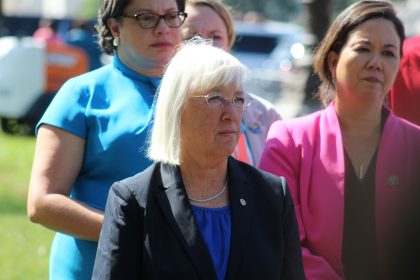Bipartisan Bill Aims to Eradicate Rural Child Care Deserts

WASHINGTON — Companion bills in the House and Senate represent a bipartisan effort to enhance rural child care by eradicating so-called “child care deserts.”
The legislation, known as the Expanding Childcare in Rural America Act, would create six new programs to get U.S. Department of Agriculture funding to where it is needed to make child care more affordable and accessible in rural areas.
“Child care in rural communities like mine is next to impossible to find and afford,” said Rep. Marie Gluesenkamp Perez, D-Wash., explaining why she introduced the bill in a written statement.
“Before coming to Congress, my husband and I brought our son to our auto repair shop most days because there were no other child care options available,” she said.
Should the bill advance, loans and grants will be targeted to areas of the country that currently have little-to-no child care infrastructure. The money can then be used to build facilities or train child care professionals.
Linda Smith, the director of the early childhood development initiative for the Bipartisan Policy Center, said the bill focuses on supporting the business aspect of child care facilities.
Smith explained that the business model for child care is “very fragile,” and the small populations of rural areas make it hard for programs to make ends meet.
According to a 2018 study by the Center for American Progress, a left-of-center public policy institute, three in five rural communities lack adequate child care.
The same report classified 59% of rural communities as “child care deserts,” meaning there weren’t enough child care facilities to support local demand.
The authors said the situation was worst in low-income areas where families are dependent on both parents having an income just to get by. In many of these communities, families in need of child care services simply couldn’t pay for them, leading to facility closures.
“Our nation’s child care providers are the workforce behind the workforce,” Patrick Murray, the vice president of government relations for KinderCare Learning Companies, an operator of for-profit child care facilities, said in a written statement.
“To support economic development, the child care sector needs partnership from government, employers, and community to remain viable,” he said.
Growth and development of child care programs and facilities is a main target of this bill. Anne Hedgepeth, the chief of policy and advocacy for Child Care Aware of America, said an important emphasis of the bill is to meet programs where they are at.
“We want to see the supply of center-based programs and the supply of family or home-based programs increase to meet the real demand across the country,” she said.
Smith shared that many rural areas depend on childcare sponsored through churches or Native American reservations. She said the bill will allocate money to programs that are eligible under the childcare development grant fund criteria, which could include these facilities.
Despite the uphill battle, Smith said she sees potential for the bill to be effective.
“I honestly have to say I don’t expect this to be a hard lift,” said Smith. “We have seen a lot of interest and enthusiasm from people around the country, especially those involved with rural development, to figure out what to do about childcare.”
In addition to Gluesenkamp Perez, sponsors of the House bill include Reps. Lori Chavez-DeRemer, R-Ore., Tracey Mann, R-Kan., and Yadira Caraveo, D-Colo.
In the Senate, a companion bill is sponsored by Sens. Sherrod Brown, D-Ohio, Roger Marshall, R-Kan., and Tina Smith, D-Minn.
“As a pediatrician, I’ve seen the toll it takes on families when they don’t have affordable, reliable child care,” Caraveo said in a written statement. “That burden is even more present in rural communities, where there are fewer providers, and families may have to travel a great distance for child care. I’m proud to join this bipartisan effort to ensure rural families have access to the low-cost, high-quality child care they need and deserve.”
You can reach us at [email protected] and follow us on Facebook and Twitter

























